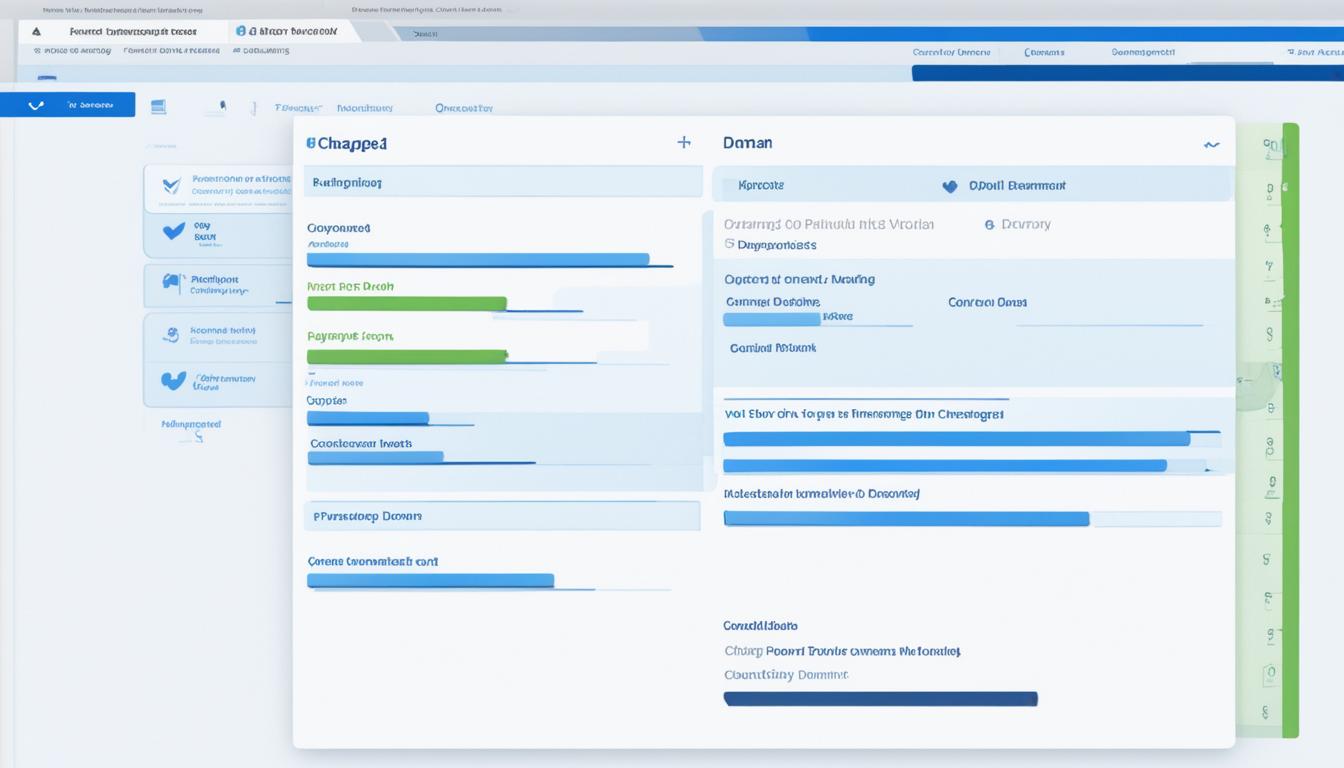Why are DNS packets sent in TCP and not UDP?
Did you know that DNS primarily uses the User Datagram Protocol (UDP) for serving requests? You might wonder why DNS packets are sent in TCP and not UDP when UDP is faster and more efficient for handling small data transfers.
Despite the advantages of UDP, there are specific scenarios where DNS packets are sent in TCP. This article will explore the reasons behind this protocol choice and shed light on the differences between TCP and UDP in DNS.
Key Takeaways:
- UDP is the primary protocol for serving DNS requests due to its speed and efficiency.
- TCP is used for tasks like zone transfers and handling large responses in DNS.
- DNS over TCP and DNS over TLS provide encryption and enhanced security.
- UDP’s stateless communication model enables efficient processing of multiple requests.
- Using UDP in DNS reduces resolving time and ensures quick delivery of DNS information.
Understanding DNS and its Protocols
Welcome to section 2 of our article, where we dive into the inner workings of the Domain Name System (DNS) and explore the protocols it utilizes for reliable communication.
DNS, operating at the application layer, plays a vital role in translating domain names into IP addresses. To ensure efficient and secure communication, DNS leverages either the User Datagram Protocol (UDP) or Transmission Control Protocol (TCP) for transport.
Primarily, DNS relies on UDP due to its speed and efficiency. UDP, being a connectionless protocol, offers faster performance as it does not require a 3-way handshake before transmitting data. This makes UDP a suitable choice for handling small DNS queries, where quick response times are essential.
Why is UDP preferred for most DNS operations? First and foremost, DNS queries are typically small and can easily fit within UDP segments. This characteristic, combined with UDP’s connectionless nature, allows DNS to efficiently process multiple requests without the overhead of establishing and maintaining a connection.
However, there are scenarios where UDP has limitations. When DNS queries or responses exceed the maximum size supported by UDP, they are sent using TCP instead. TCP is a connection-oriented protocol that provides reliability and integrity of data during transmission, making it well-suited for tasks like zone transfers or handling large responses in DNS.
Reliable DNS Communication
Reliability and consistency are crucial in DNS communication. TCP ensures these qualities by establishing a connection, acknowledging received packets, and retransmitting any lost or corrupted data. This reliability comes at the cost of increased complexity and overhead, making TCP less efficient than UDP for small, time-sensitive data transfers.
DNS over TCP helps address some of the limitations imposed by UDP. For example, TCP allows DNS queries and responses to exceed the size limitations of UDP, enabling the transmission of larger data sets.
Furthermore, DNS over TLS (Transport Layer Security) provides an additional layer of encryption, ensuring secure and private communication between DNS clients and servers.
DNS Protocols Comparison
| Protocol | Advantages | Limitations |
|---|---|---|
| UDP |
|
|
| TCP |
|
|
In summary, DNS primarily utilizes UDP for its speed, efficiency, and suitability in handling most DNS tasks. UDP allows for quick and lightweight communication, making it ideal for small queries and responses. TCP, on the other hand, provides reliable communication, enabling larger queries and responses in DNS, zone transfers, and encrypted communication when necessary.
Differences Between TCP and UDP in DNS
When it comes to DNS, two transport layer protocols, TCP and UDP, play significant roles in facilitating efficient communication. While both protocols serve different purposes in the DNS ecosystem, understanding their differences is crucial for optimizing DNS performance and ensuring reliable connectivity.
TCP (Transmission Control Protocol):
TCP is known for its reliability and ability to ensure data consistency, making it suitable for certain DNS tasks. It is commonly used for tasks such as zone transfers, where large amounts of data need to be transferred accurately between DNS servers. TCP is also employed in encrypted DNS communication, including DNS over TCP and DNS over TLS, to provide secure transmission of DNS messages.
UDP (User Datagram Protocol):
On the other hand, UDP is favored for its speed and efficiency in handling small, time-sensitive DNS queries and responses. This protocol is the default choice for regular DNS queries, caching, and small data transfers. Due to its stateless communication model, UDP enables the efficient processing of multiple DNS requests, making it suitable for handling high volumes of queries.
DNS over UDP also benefits from its lightweight message format, enabling faster transmission and reducing overhead. However, there are certain scenarios where UDP might not be accessible due to firewalls or network restrictions. In such cases, DNS queries and responses are transmitted over TCP to ensure connectivity and address any communication limitations.
DNS Security Considerations:
Both TCP and UDP play roles in ensuring DNS security. While UDP is commonly used for most DNS transactions, TCP is employed for secure DNS communication as it facilitates encryption protocols like DNS over TCP and DNS over TLS. These protocols provide additional layers of security, protecting sensitive DNS information from unauthorized access.

Therefore, understanding the differences between TCP and UDP in DNS is crucial to optimize performance, enhance security, and mitigate any communication limitations arising from firewalls or network restrictions.
Benefits of Using UDP in DNS
I’m excited to share with you the numerous benefits that UDP brings to the world of DNS. As DNS (Domain Name System) plays a crucial role in translating domain names into IP addresses, it’s essential to understand how UDP enhances its operations.
One of the key advantages of UDP is its speed. When it comes to handling bandwidth-limited signals and small DNS queries and responses, UDP takes the lead. Its efficiency ensures that these tasks are executed swiftly and without delay.
Another benefit of UDP is its stateless communication model. DNS operates on a stateless basis, allowing for the efficient processing of multiple requests. UDP aligns perfectly with this model, enabling smooth and seamless handling of different DNS queries. As a result, resolving time is significantly reduced, and DNS information is delivered quickly.
Furthermore, UDP doesn’t require the establishment of a connection, resulting in lower latency. This makes it well-suited for small data transfers, further enhancing the speed and efficiency of DNS operations. Whether it’s retrieving IP addresses or updating DNS records, UDP ensures the timely delivery of data.
To summarize, the benefits of using UDP in DNS are clear. Its speed, efficiency in handling bandwidth-limited signals and small data transfers, stateless communication model, and lower latency all contribute to a smooth and reliable DNS experience.

| Benefits of Using UDP in DNS | |
|---|---|
| Speed | Efficient handling of bandwidth-limited signals and small data transfers |
| Stateless Communication | Efficient processing of multiple requests in the stateless DNS model |
| Lower Latency | No connection establishment required, resulting in reduced resolving time |
Conclusion
In conclusion, when it comes to DNS operations, UDP is the go-to protocol for its speed, efficiency, and suitability for most DNS tasks. UDP enables fast DNS resolution, ensuring quick delivery of queries and responses. It efficiently handles small, time-sensitive data transfers, making it ideal for handling the majority of DNS traffic.
While UDP is the primary choice for DNS, TCP has its role in specific cases such as zone transfers, handling larger responses, and encrypted communication. TCP provides reliability and ensures data consistency, making it a valuable tool for these specific tasks.
By utilizing UDP and TCP in DNS communication, the internet operates smoothly and efficiently, connecting users to their desired websites and services. The combination of UDP’s speed and efficiency with TCP’s reliability ensures reliable DNS communication and efficient traffic control. Together, these protocols form the backbone of reliable DNS communication, enabling seamless browsing experiences and efficient data transfers on the internet.
FAQ
Why are DNS packets sent in TCP and not UDP?
What is the difference between TCP and UDP in DNS?
How does DNS handle network restrictions and firewalls?
What are the benefits of using UDP in DNS?
What protocols are used for encrypted DNS communication?
- How Strategic SEO Drove Growth for a CPAP E-commerce Brand - July 24, 2025
- Top 3 SEO Companies in Toronto: An Analytical Comparison - July 23, 2025
- SEO for Entry Door Services - April 24, 2025





















Post Comment
You must be logged in to post a comment.